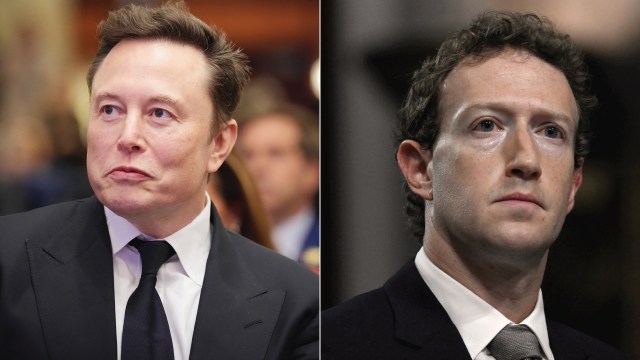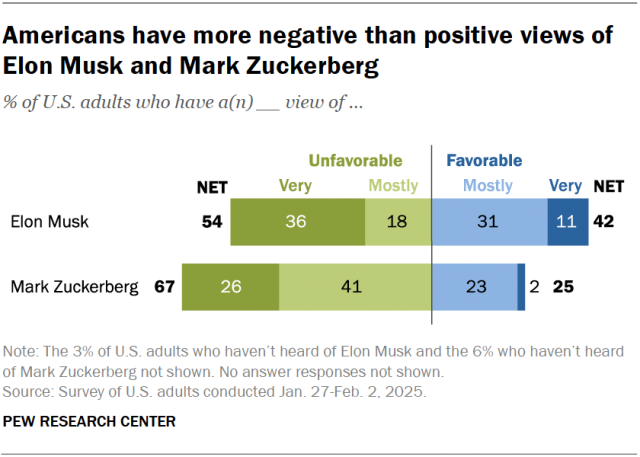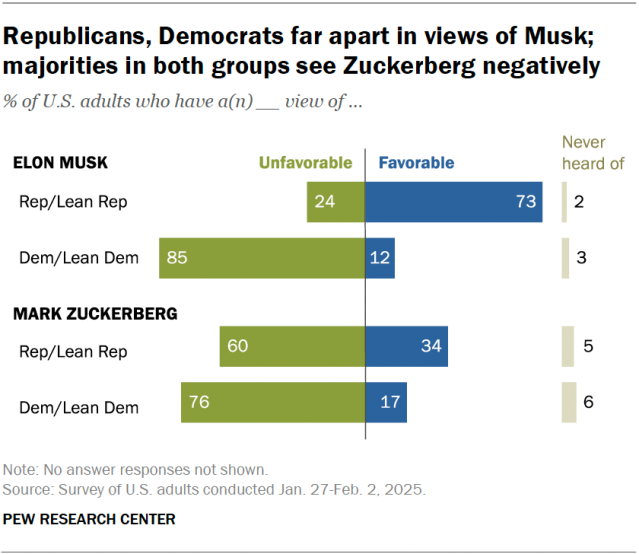
Americans’ views of two prominent tech executives – Elon Musk and Mark Zuckerberg – tilt more negative than positive. Musk is a deeply polarizing figure, with Republicans largely viewing him favorably and Democrats largely unfavorably. By contrast, views of Zuckerberg are less polarized, with majorities in both parties viewing him unfavorably.

Just over half of U.S. adults (54%) say they have an unfavorable view of Musk, including 36% who have a very unfavorable opinion of him. About four-in-ten (42%) express a favorable view, including 11% who are very favorable, according to a Pew Research Center survey conducted Jan. 27-Feb. 2, 2025.
Musk is the head of companies such as Tesla and X (formerly Twitter). He is also currently a “special government employee” of the Trump administration, leading the Department of Government Efficiency as it seeks to cut federal spending.
Two-thirds of Americans have an unfavorable view of Zuckerberg. This includes 26% who are very unfavorable toward him. Another quarter view him favorably, including just 2% who see him very favorably.
Zuckerburg is the chairman and CEO of Meta, a company that owns social media platforms including Facebook and Instagram. Zuckerberg hasn’t been immune to political debates, including over his recent decision to end fact-checking on his platforms.
Few Americans are unfamiliar with either of these tech leaders. Fewer than one-in-ten say they’ve never heard of Musk (3%) or Zuckerberg (6%). Previous Center surveys have found that Americans largely feel that social media companies have too much power in American politics.
Views of Musk, Zuckerberg by party
With his recent involvement in the Trump administration, views of Musk are deeply divided along party lines. Republicans are far more favorable than Democrats toward Musk:

- 73% of Republicans and Republican-leaning independents – including 84% of conservative Republicans – hold a favorable view. This compares with 12% of Democrats and Democratic leaners.
- Far more Democrats than Republicans have an unfavorable view of Musk (85% vs. 24%).
By comparison, majorities in both parties have an unfavorable view of Zuckerberg, though Democrats are more likely than Republicans to see him negatively:
- Six-in-ten Republicans and around three-quarters of Democrats (76%) – including 87% of liberal Democrats – have an unfavorable view.
- Smaller shares in both parties hold a favorable one (34% of Republicans and 17% of Democrats).
Views of Musk, Zuckerberg by age
The public’s views of Musk and Zuckerberg also modestly vary by age, with younger adults somewhat more negative of both.
- 67% of adults under 30 hold an unfavorable view of Musk, compared with about half of those ages 30 to 49 (53%) and those 50 and older (49%).
- Seven-in-ten adults under 30 and 72% of those ages 30 to 49 have an unfavorable opinion of Zuckerberg. This compares with 62% of those 50 and older.
Age differences are particularly pronounced among Republicans when it comes to views of Musk. About half (47%) of Republicans under 30 express an unfavorable view of Musk. By comparison, 23% of those ages 30 to 49 and even fewer of those 50 and older (16%) see him negatively. For Democrats, favorability of Musk does not differ across these three age groups.
Note: Here are the questions used for this report, the topline and the survey methodology.